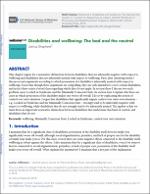Chapter Disabilities and wellbeing
The bad and the neutral
Author(s)
Shepherd, Joshua
Collection
WellcomeLanguage
EnglishAbstract
This chapter argues for a normative distinction between disabilities that are inherently negative with respect to wellbeing and disabilities that are inherently neutral with respect to wellbeing. First, after clarifying terms I discuss recent arguments according to which possession of a disability is inherently neutral with respect to wellbeing. I note that though these arguments are compelling, they are only intended to cover certain disabilities, and in fact there exists a broad class regarding which they do not apply. In section three I discuss two such problem cases: Locked-in Syndrome and the Minimally Conscious State. In section four I explain why these are cases in which possession of the disability makes one worse off overall. I do so by explicating the notion of control over one’s situation. I argue that disabilities that significantly impair control over one’s own situation – e.g., Locked-in Syndrome and the Minimally Conscious State – strongly tend to be inherently negative with respect to wellbeing, while disabilities that do not strongly tend to be inherently neutral. The upshot is that we must draw an important normative distinction between disabilities that undermine this kind of control, and disabilities that do not.


 Download
Download